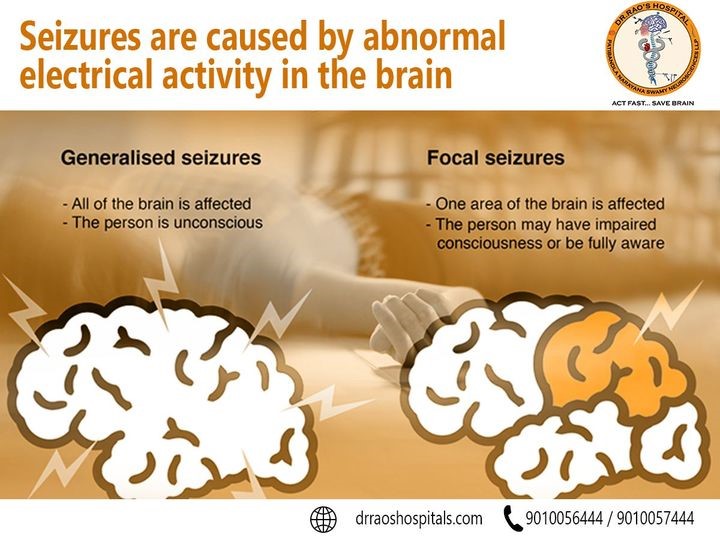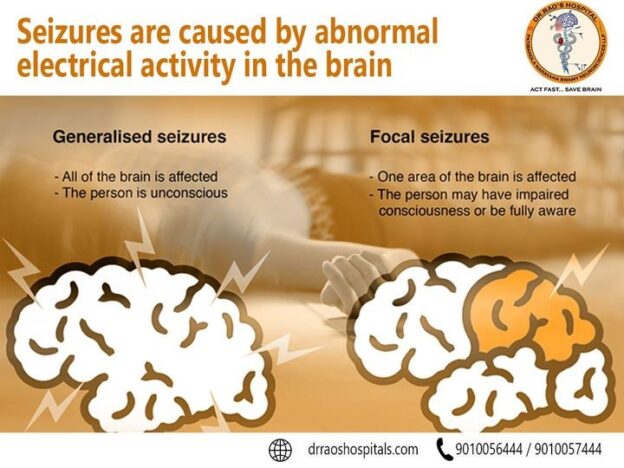The Best Epilepsy Surgery in Andhra Pradesh – Dr Raos Hospital
Epilepsy is a neurological condition in which brain activity becomes aberrant, resulting in seizures or episodes of odd behavior, feelings, and occasionally loss of awareness.
Are you suffering from epilepsy?
Don’t worry! You can get effective treatment for epilepsy at Dr. Rao’s Hospital, Guntur. We are one of the best neurology hospitals in Guntur. We have experienced neurosurgeons like Dr. Mohana Rao Patibandla, a fellowship-trained epilepsy surgeon from the USA. Our hospital in Guntur provides solutions for all neurological disorders, including epilepsy.
This article discusses the treatment options for epilepsy. But before we discuss the treatment options, first, let us first examine the causes of epilepsy. According to dnaindia
What are the Causes of Epilepsy?

The following factors contribute to the development of epilepsy:.
- • Genetics: Genetic factors are one of the causes of epilepsy. Epilepsy is more common in those who have specific genes.
- • Head trauma: A head injury may result in epilepsy.
- • Brain problems: Brain tumors and strokes can induce epilepsy.
- • Infectious illnesses: Infectious disorders such as meningitis, AIDS, and viral encephalitis can induce epilepsy.
- • Prenatal injury: Epilepsy can develop as a result of brain damage that happens prior to birth.
- Several risk factors contribute to epilepsy. The specifics are as follows:
- • Age: Children and the elderly are more likely to develop epilepsy.
- • Family History: If epilepsy runs in your family, you’re likely to get it as well.
- • Head injuries: Epilepsy is more likely to occur in those who have had a head injury.
- • Infectious diseases: Infectious diseases like meningitis and AIDS can increase your risk of developing epilepsy.
What are the symptoms of epilepsy?

The most common sign of epilepsy is seizures. Symptoms vary from one individual to the next and depending on the type of seizure.
Focal or partial seizures
There is no loss of consciousness in a simple partial seizure. Among the signs and symptoms are:
- • Changes in the senses of taste, smell, sight, hearing, and touch
- • Dizziness
- • Limb tingling and twitching
- There is a loss of awareness or consciousness with complex partial seizures. Other signs and symptoms include:
- • Blank stare
- • Unresponsiveness
- • Repeating the same moves
Generalized seizures
Seizures that affect the entire brain are known as generalized seizures. There are six different types:
Absence seizures, often known as “petit mal seizures,” result in a blank stare. Repetitive motions, such as lip-smacking or blinking,, may occur due to this type of seizure. There is frequently a brief loss of awareness as well.
Muscle stiffness is a side effect of tonic seizures.
Atonic seizures result in a loss of muscle control, which might cause you to fall unexpectedly.
Clonic seizures are characterized by repeatedly jerky muscular movements in the face, neck, and arms.
A rapid twitching of the arms and legs characterizes myoclonic seizures.
Grand mal seizures were once known as tonic-clonic seizures. Among the signs and symptoms are:
• Body becomes stiff
• Shaking
• Inability to control bladder or bowel movements. There can also be loss of consciousness.
What is intractable epilepsy?
Intractable epilepsy is defined as seizures that two epileptic medicines can’t control at their maximum tolerable doses for two years. (Intractable means “not easily managed or relieved.“) It’s also called refractory, uncontrolled, or drug-resistant epileptic seizures. Nearly 36% of epilepsy patients are refractory to medication, and we need to find surgical candidates in this population.
What will you do when you see your close relative having seizures?

Now, let us discuss the treatment options available in Guntur to treat epilepsy.
What solutions are provided by Dr. Rao’s Hospital in Guntur to treat epilepsy?
We use the following treatment options to manage and treat epilepsy:
Anti-epileptic medications (AEDs)
The most common treatment for epilepsy is antiepileptic drugs (AEDs). In about 7 out of 10 people, they aid in seizure management.
AEDs function by altering the chemical levels in your brain. They cannot cure epilepsy, but they can prevent seizures. AEDs come in a variety of forms, including pills, capsules, liquids, and syrups. In most cases, you must take the medication daily.
Your doctor in Guntur will begin with a low dose and then raise it until you no longer have seizures. If the first medicine you try does not work, your doctor may suggest you try a different type.
You must follow any recommendations for when and how much to take AEDs. If you suddenly stop taking an AED, you risk having a seizure. Drowsiness, headaches, rashes, tremors, etc., are some of the side effects of AEDs.
Surgery on the brain
There’s a reasonable probability that your seizures will stop completely following surgery in certain instances, such as the following: 70% in temporal lobe seizures and 50% in nontemporal lobe seizures.
• AEDs are not controlling your seizures.
Tests show that a disorder in a small area of your brain that is treatable without having severe side effects is the cause of your seizures.
Brain scans (MRI seizure protocol), electroencephalograms (EEG), and other testing are conducted before surgery. The findings of these tests will help you and your doctor determine whether surgery is a viable choice for you.
Resection surgeries:
The identified epilepsy focus was removed during this procedure with the help of brain electric activity.
Epilepsy surgery is usually performed while you are unconscious, using a general anesthetic.
The neurosurgeon at Dr. Rao’s Hospital in Guntur makes a small cut in your head and a hole in your skull to remove the affected area of the brain.
At the conclusion of the procedure, the openings in your skull and scalp are closed. Make sure you discuss the risks with your neurosurgeon before undergoing surgery.
Stimulation procedures:
When we cannot resect the lesion due to eloquence or recognize the precise area, we stimulate the brain or vagus nerve.
• Vagus nerve stimulation:
In vagus nerve stimulation, doctors implant a vagus nerve stimulator beneath the skin of your chest, similar to a heart pacemaker. The cables from the stimulator are connected to the vagus nerve in your neck.
The battery-operated device uses the vagus nerve to send electrical energy bursts to your brain. The device’s mechanism for preventing seizures is unknown, although it can usually reduce seizures by 50%. Side effects of vagus nerve stimulation include throat pain, hoarseness, shortness of breath, and coughing.
Responsive Neurostimulation:
We know that electrical activity comes from the two critical areas, so we placed two electrodes connected to a battery in the skull.
DBS (deep brain stimulation):
This method targets the anterior thalamic nucleus, resulting in a 50% decrease in the devastating seizure frequency.
Ketogenic diet
A ketogenic diet is a high-fat, low-carbohydrate, and low-protein diet that is supposed to reduce the likelihood of seizures in children by altering the quantities of substances in the brain.
Conclusion
As every problem comes with a solution, the problem of epilepsy also comes with a solution. You can get effective solutions for epilepsy by visiting Dr. Rao’s Hospital in Guntur. We have solutions for all your neurological problems. So, visit us now
Dr. Rao’s Contact Information:
- Phone: 9010056444, 9010057444
- Email: info@drraoshospitals.com
- Address: Old Bank St, GV Thota, Beside AK Biryani Point, Guntur, Andhra Pradesh 522001
- Website: Dr. Rao’s Hospital




